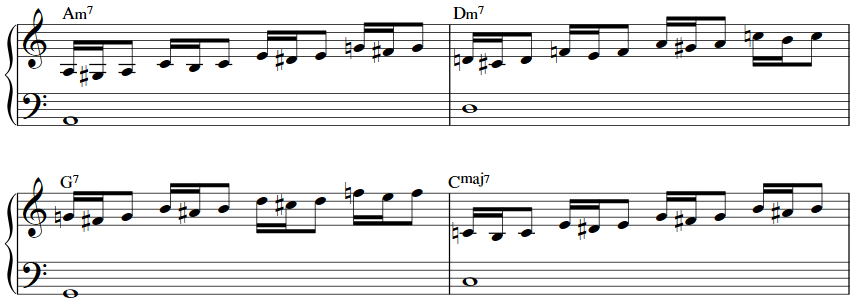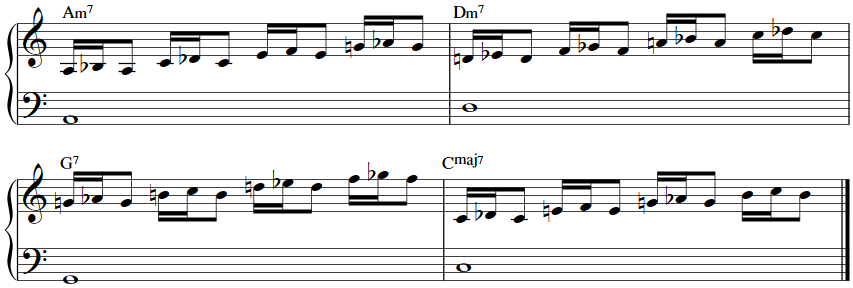In Part 1 of our article “Improvisation Practice Tips,” we looked at three tips which featured exercises meant to help you quickly identify chord tones and scale degrees. It is intended that you master those exercises before continuing with the more advanced exercises presented here. The exercises below are also meant to be practiced sequentially, meaning that you should practice and master them in the order they are presented before moving on to the next exercise. As you’re hopefully starting to notice, improvisation practice involves a certain amount of theory and a lot of awareness of concepts such as chord tones, scale degrees, and patterns.
Improvisation Practice Tip #4: Using Chromatic Tones
Before we start this exercise, I have to repeat my above point once more: be sure to complete and master Practice Tips #1-3 prior to practicing this tip. In tip #4 we will introduce chromatic tones. We’re going to borrow from the exercise presented in practice tip #1 in which we played the chords tones in the following order – root, 3rd, 5th, 7th. Here it is again:
Now we’re going to play the chord tone, then the note a half-step below, and then the chord tone again using the following rhythm:
Practice this exercise throughout an entire tune, in time, until you are able to play without any mistakes.
Improvisation Practice Tip #5: More Chromatic Tone Practice
Now that you’ve identified all of the chord tones and approached each from a half-step below, it’s time to really put your knowledge to the test. In this step we’re going to mix up the pattern so that you’re not always playing in the same order (i.e., root, 3rd, 5th, 7th). Now, practice playing the same exercise as above using the following patterns:
- 7th, 5th, 3rd, root;
- 7th, 3rd, 5th, root;
- 3rd, root, 7th, 5th;
- 3rd, 7th, 5th, root;
- 5th, root, 3rd, 7th.
Improvisation Practice Tip #6: Chromatic Approach from Above
C’mon, you probably could have guessed this was coming. This is the same exercise as in tip #4 except that now we’re approaching every chord tone from a half-step above, like so:
And yep, you guessed it. Once you’ve mastered this exercise the next logical step is being able to play the chord tones/chromatic approach in any order, not just root, 3rd, 5th, 7th. Try practicing these patterns:
- 7th, 5th, 3rd, root;
- 7th, 3rd, 5th, root;
- 3rd, root, 7th, 5th;
- 3rd, 7th, 5th, root;
- 5th, root, 3rd, 7th.
Improvisation Practice Tip #7: Practicing Combinations
Now that we’ve gone through the exercises above, practice combining the exercises in tips #4 and #6 so that you are constantly varying the approach to the chord tone. Practice alternating half-step above then half-step below, and then practice some random order, as below:
Some Friendly “I’ve-Been-There” Advice
Is improvisation practice really this involved, this tough? Well, yes and no. For some these exercises present immediate access to something tangible they can practice that provides structure, organization, and results. For others these exercises seem daunting, mechanical, and perhaps overwhelming. The truth is that practicing improvisation is a long-term study, and different things work better for different students. The important thing is to have something specific that you can work on in your practice sessions, and these exercises are an excellent place to start. Happy practicing!





